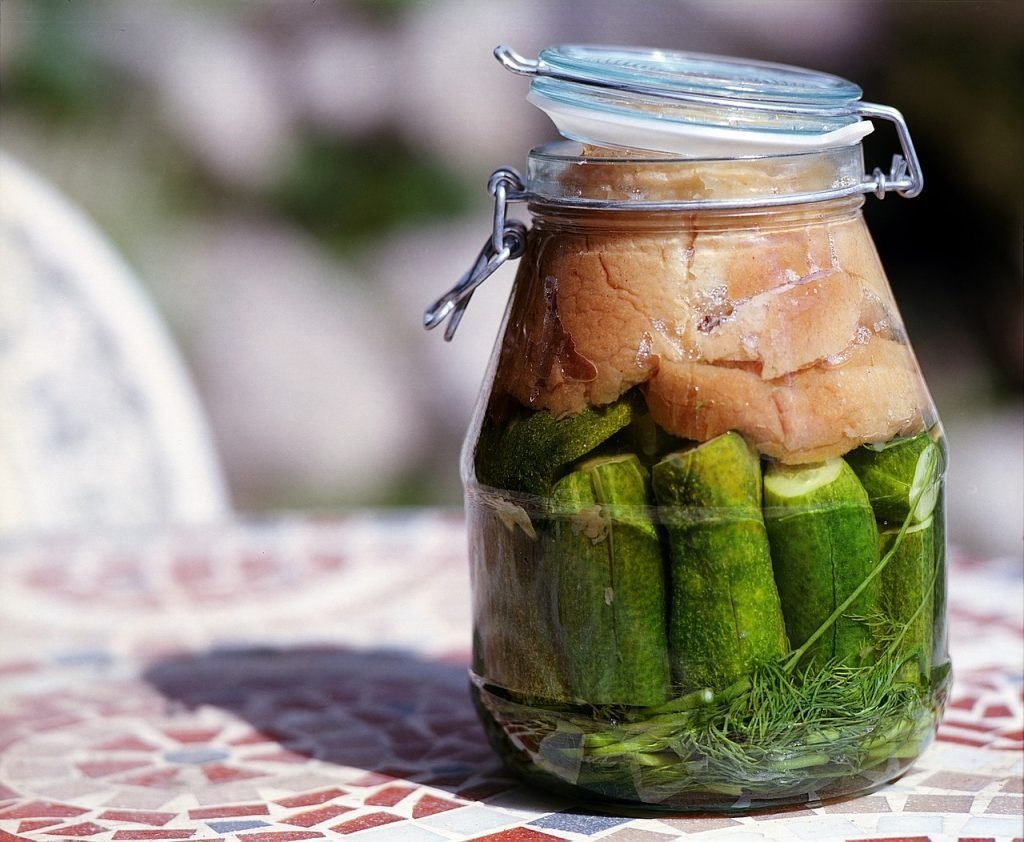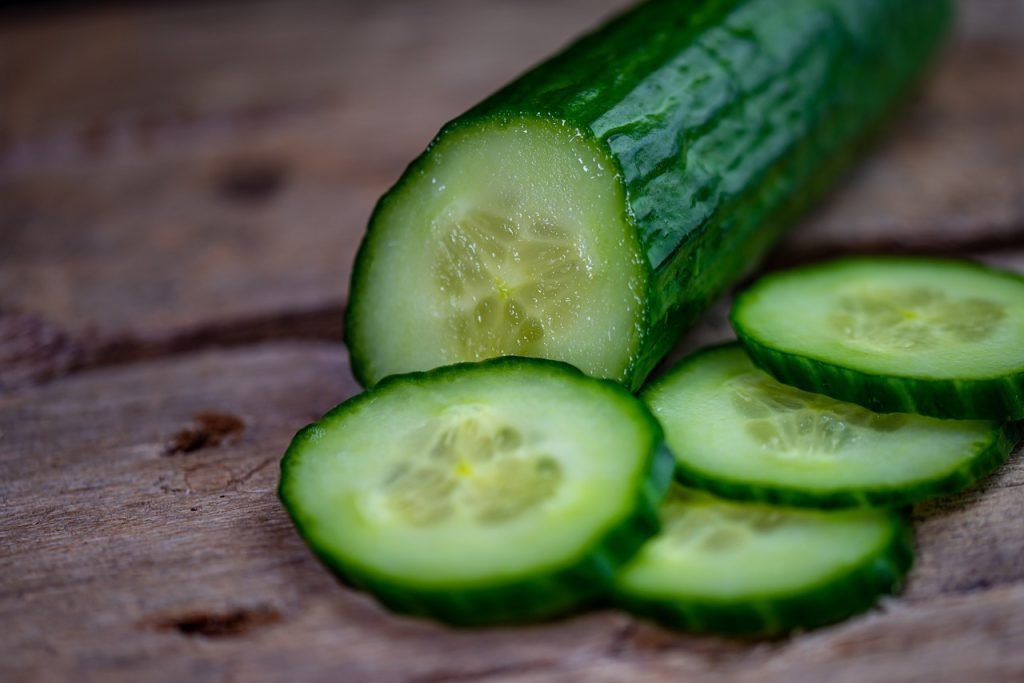Pickles, those tangy, crunchy delights, have carved a niche for themselves in the culinary world, finding their way onto our plates and into our hearts.
From the classic dill pickle to exotic variations, these preserved cucumbers have become a beloved addition to sandwiches, salads, and snack platters.
Pickle juice, the brine in which pickles are immersed, has also gained attention for its unique flavor and purported health benefits.
As we embark on unraveling the mysteries of pickles and pickle juice, it’s essential to appreciate their widespread popularity and the cultural significance they hold.

Addressing Common Questions About the Effects of Pickles on Digestive Health
Amidst the crunch and zest, questions arise about the impact of pickles on digestive health. Can pickles give you diarrhea? Do they make you poop? These are common queries that deserve careful consideration. In this blog post, we’ll address these questions, separating fact from fiction to provide a comprehensive understanding of how pickles interact with our digestive systems.
Importance of Understanding the Nutritional Value of Pickles
Beyond their taste, pickles offer a spectrum of nutritional elements that contribute to our well-being.
It’s crucial to go beyond the surface and delve into the nutritional value of pickles.
From vitamins and minerals to potential health benefits, comprehending what pickles bring to the table can guide us in making informed dietary choices.
Nutritional Components of Pickles:
1. Cucumbers:
- Health Benefits:
- Low in Calories: Ideal for weight management.
- Hydration: High water content contributes to overall hydration.
2. Vinegar:
- Health Benefits:
- Acetic Acid: May aid digestion and help regulate blood sugar levels.
- Antioxidants: Potential health benefits due to its antioxidant properties.
3. Spices (Garlic, Dill, Mustard Seeds, etc.):
- Health Benefits:
- Antimicrobial Properties: Garlic may have antibacterial and antiviral effects.
- Digestive Benefits: Dill may aid digestion and alleviate indigestion.
4. Salt:
- Health Considerations:
- Sodium Content: High sodium intake may contribute to hypertension and water retention.
- Moderation is Key: Excessive salt intake should be avoided.
5. Fiber:
- Health Benefits:
- Promotes Regular Bowel Movements: Supports digestive health and prevents constipation.
Nutritional Components of Pickle Juice:
1. Vinegar:
- Health Benefits:
- Acetic Acid: May aid digestion, support weight loss, and have potential blood sugar regulation benefits.
2. Electrolytes (Sodium and Potassium):
- Health Benefits:
- Hydration: Essential for maintaining proper fluid balance in the body.
- Muscle Function: Crucial for muscle contractions and nerve impulses.
3. Antioxidants:
- Health Benefits:
- Free Radical Scavengers: Help protect cells from oxidative stress.
4. Possible Drawbacks:
- High Sodium Content: Excessive consumption may contribute to high blood pressure and fluid retention.
- Acidic Nature: May be harsh on tooth enamel; drinking water afterward can help mitigate this.

Pickles and Digestive Health
The Pickle Predicament: Unraveling the Diarrhea Dilemma
Pickles, the crunchy accomplices to our meals, often spark questions about their impact on digestive health. The question often times asked is:
Can pickles give you diarrhea?
Unveiling the Connection
To address the query of whether pickles can lead to diarrhea, we’ll closely examine the components of pickles, focusing on how their distinctive blend of ingredients may influence digestive processes.
From brine to spices, understanding these elements is key to comprehending the intricate relationship between pickles and potential digestive distress.
Factors at Play
The digestive system is a complex orchestra, and several factors may contribute to issues related to pickles. We’ll explore the role of sodium, individual sensitivities, and the impact of overconsumption.
By unraveling these factors, we aim to provide a comprehensive understanding of why some individuals might experience digestive issues after indulging in the beloved pickle.
Answer: Pickles are unlikely to be a direct cause of diarrhea for most individuals. While some may experience digestive discomfort, the common pickle’s ingredients, such as cucumbers, water, vinegar, and spices, usually do not lead to diarrhea.
However, excessive consumption or individual sensitivities may contribute to digestive issues. Moderation and paying attention to personal tolerance levels are key.
The Call of Nature: Do Pickles Make You Poop?
Continuing our exploration of the fascinating world of pickles and digestive health, we now turn our attention to another common query:
Do pickles make you poop?
Now we will unravel the mysteries behind the impact of pickles on bowel movements, exploring the role of fiber in promoting regularity.
Unleashing the Impact
Curious about whether pickles have a say in your bathroom habits? Let’s dissect the relationship between pickles and poop, examining the intricate dance that occurs within your digestive system after indulging in these crunchy delights.
Fiber’s Role in Regularity
One key player in the digestive drama is fiber. The fiber content in pickles may contribute to promoting regular bowel movements. Understanding this aspect sheds light on the potential benefits that pickles can bring to your digestive routine.
Answer: Yes, pickles can have a mild laxative effect for some people. The fiber content in pickles, especially in the skin of cucumbers, promotes regular bowel movements.
Including pickles in your diet in moderation can contribute to a healthy digestive routine. However, individual responses may vary, so it’s essential to observe how your body reacts.
Tackling Flatulence Concerns
As we navigate the digestive landscape, concerns about flatulence often arise. Can pickles cause gas? In this segment, we address the worries surrounding pickles and their potential role in creating those awkward moments.
Additionally, we identify potential triggers for gas in pickles and whether pickles truly deserve the blame for those uncomfortable moments.
Not all pickles are created equal when it comes to causing gas. We’ll identify specific elements in pickles that may contribute to gas, helping you make informed choices about your pickle preferences.
Answer: While pickles themselves may not be the primary cause of gas, certain factors like sodium content and individual sensitivities can contribute to flatulence.
Opting for low-sodium pickles and being mindful of portion sizes can help minimize the potential for gas.

Pickle Juice and its Health Benefits
Unveiling the Potential: Does Pickle Juice Help with Constipation?
Pickle juice, often dismissed as a mere byproduct of pickles, may hold unexpected health benefits. In this segment, we uncover the potential of pickle juice in aiding constipation. We’ll delve into the analysis of its potential laxative properties and explore the role of electrolytes in relieving digestive discomfort.
Decoding the Laxative Puzzle
Can a sip of pickle juice truly act as a remedy for constipation? We scrutinize the components of pickle juice to discern its potential impact on promoting regular bowel movements.
Electrolytes: Allies in Digestive Health
Beyond flavor, pickle juice houses electrolytes that might play a role in digestive well-being. We explore how these essential ions could contribute to easing constipation, offering a holistic perspective on pickle juice as a potential digestive remedy.
From Pickle Jars to Potential Relief: Pickle Juice and Headaches
Can the tangy elixir extend its reach to alleviate headaches and migraines? In this part, we scrutinize the claims surrounding pickle juice as a remedy for headaches and delve into the scientific explanations behind its potential impact on migraines.
1. Probing Headache Relief
The notion of pickle juice as a headache remedy has circulated, and we aim to uncover the validity of this claim. We embark on a journey to scrutinize the potential behind pickle juice and its role in providing relief from headaches.
2. Scientific Insights into Migraine Relief
For those plagued by migraines, pickle juice might offer unexpected relief. We delve into the scientific intricacies, exploring how pickle juice interacts with the body to potentially alleviate migraine symptoms.

Nausea and Pickles
A Sour Solution: Do Pickles Help with Nausea?
Nausea, an unpleasant sensation that can disrupt daily life, prompts the question: Can pickles provide relief? In this segment, we assess the effectiveness of pickles in alleviating nausea.
We’ll delve into the evaluation of this age-old remedy and explore the potential mechanisms behind its purported ability to soothe unsettled stomachs.
1. Gauging the Effectiveness
Does the tangy crunch of a pickle truly have the power to ease nausea? We critically evaluate the claims surrounding pickles as a remedy for this uncomfortable sensation, separating anecdotal evidence from scientifically supported effectiveness.
2. Unraveling the Mechanisms
Beyond anecdotes, we explore the potential mechanisms behind pickles’ ability to alleviate nausea. Understanding the science behind this remedy provides insight into how pickles may interact with the body to offer relief in moments of queasiness.
Pickles and Nutritional Benefits
Pickle Power: Are Pickles Good for Constipation?
As we delve into the nutritional landscape of pickles, the question arises: Are pickles good for constipation? In this section, we meticulously examine the nutritional content of pickles that may contribute to constipation relief.
Additionally, we explore the role of incorporating pickles into a balanced diet for overall digestive health.
1. Nutritional Content Analysis
Can the humble pickle be a source of relief for constipation? We conduct a detailed examination of the nutritional components within pickles, shedding light on specific elements that may play a role in promoting regular bowel movements.
Pickles in a Balanced Diet
Beyond isolated benefits, we explore how pickles can be integrated into a balanced diet to support overall digestive health. Discover how this crunchy snack can play a part in maintaining a harmonious digestive routine.
Finding Balance: Are Pickles Good for Diarrhea?
In the quest for understanding pickles’ impact on digestive health, the spotlight now turns to diarrhea. Are pickles good for diarrhea, or is caution advised?
We identify nutrients in pickles that may be beneficial during bouts of diarrhea and stress the importance of moderation in consumption.
Beneficial Nutrients in Pickles
Surprisingly, pickles may offer support during episodes of diarrhea. We pinpoint specific nutrients within pickles that could aid in mitigating discomfort, providing valuable insights for those navigating digestive challenges.
Moderation Matters
While exploring potential benefits, moderation remains key. We discuss the importance of mindful consumption, ensuring that the potential advantages of pickles for diarrhea relief are balanced with prudent dietary choices.

Pickle Juice as a Laxative
Unveiling Nature’s Remedy: Is Pickle Juice a Laxative?
Pickle juice, often dismissed as a mere condiment, holds a potential surprise – could it be a natural laxative? In this section, we delve into the discussion surrounding pickle juice as a laxative.
We’ll scrutinize the components of pickle juice that may have a laxative effect and provide essential guidelines for its safe consumption.
1. Components at Play
The journey begins by dissecting the elements within pickle juice that might contribute to its potential laxative properties. By unraveling the components, we aim to offer a clearer understanding of how pickle juice interacts with the digestive system.
2. Guidelines for Safe Sipping
While exploring the potential benefits, safety is paramount. We provide comprehensive guidelines for the safe consumption of pickle juice as a laxative, ensuring that individuals can incorporate this tangy remedy into their routines without compromising well-being.
Conclusion
A. Wrapping Up: The Potential Impact of Pickles and Pickle Juice on Digestive Health
As we conclude our exploration into the world of pickles and pickle juice, it’s essential to recap the potential effects on digestive health.
From constipation relief to the intriguing possibility of alleviating nausea, we’ve journeyed through various aspects of how these tangy treats can influence our well-being.
Balancing Act: The Crucial Role of Moderation and Individual Variation
In the world of dietary choices, moderation and individual variation emerge as guiding principles. While pickles and pickle juice may offer benefits, the key lies in a balanced approach.
We emphasize the importance of moderation – understanding that too much of a good thing may not always be beneficial.
Moreover, recognizing individual variations in how our bodies respond to pickles underscores the need for personalized dietary choices.
Seeking Expert Advice: Consultation with Healthcare Professionals
It’s important to note that the health impact of pickles and pickle juice depends on individual factors, including overall diet, health conditions, and personal sensitivities.
Moderation is key, especially for those with specific dietary concerns. Always consult with a healthcare professional for personalized advice.
The complexities of our bodies necessitate personalized guidance. We encourage readers to consult with healthcare professionals for tailored advice.
While our exploration provides insights into potential benefits and considerations, healthcare professionals can offer personalized recommendations based on individual health conditions and needs.
Additional Resources
1. Understanding the Science Behind Pickle Juice and Digestion:
- “The Truth About Pickle Juice: Can It Help with Digestion and Other Health Issues?” from WebMD: This article provides a balanced overview of the potential benefits and drawbacks of pickle juice for digestive health, citing scientific research and expert opinions. It covers topics like its impact on gut bacteria, electrolyte content, and potential effects on constipation and nausea: https://www.webmd.com/food-recipes/health-benefits-pickles
2. Exploring the Nutritional Value of Pickles:
- “Pickles: Are They Superfoods for Your Gut?” from Ixcela: This article delves into the nutritional components of pickles, highlighting their fiber content, vitamins, minerals, and potential prebiotic properties. It also discusses the role of spices in pickles and their potential health benefits: https://guthealthimprovement.com/do-pickles-have-probiotics/
3. Getting Creative with Pickle Recipes for Digestive Health:
- “Pickles for Probiotics: 5 Delicious Ways to Get Your Daily Dose” from Bon Appétit: This article offers a collection of recipes using pickles that cater to digestive well-being. It features dishes like probiotic pickles with turmeric and ginger, fermented sauerkraut salad with dill, and gazpacho with pickled cucumber relish: https://www.bonappetit.com/video/watch/brad-makes-half-sour-pickles

